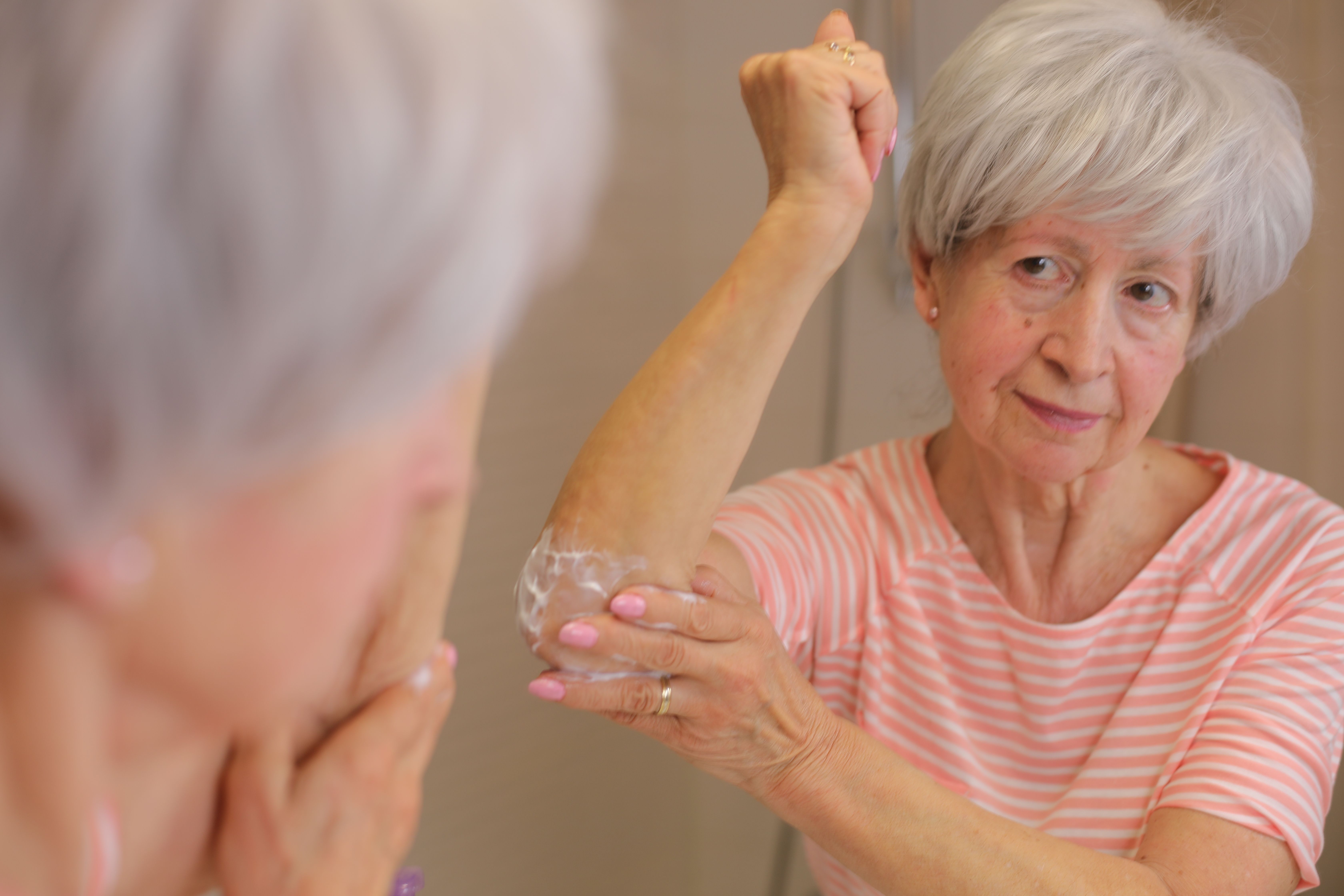- Center on Health Equity & Access
- Clinical
- Health Care Cost
- Health Care Delivery
- Insurance
- Policy
- Technology
- Value-Based Care
Tildrakizumab Found Effective, Safe in Elderly Patients With Psoriasis
A multicenter study finds no difference in outcomes between frail and nonfrail elderly patients treated with tildrakizumab over 2 years.
Elderly patients aged 65 and older with psoriasis achieved high rates of skin clearance and treatment persistence with tildrakizumab, with over 80% remaining on therapy at 2 years and no new safety concerns identified, according to one study.1
This multicenter retrospective study is published in Psoriasis: Targets and Therapy.

“In the present study, tildrakizumab was effective and safe in the treatment of moderate-severe psoriasis for up to 2 years of treatment in both elderly and frail elderly patients,” wrote the researchers of the study. “Our study is also one of the few reporting on concomitant topical treatment during biological therapy.”
Tildrakizumab is an anti–interleukin-23 p19 monoclonal antibody approved for the treatment of patients with chronic moderate to severe plaque psoriasis, offering both early and sustained improvements in disease severity and quality of life. Recent findings presented at the 2025 American Academy of Dermatology Annual Meeting reinforce its clinical value.2
The study assessed the 2-year effectiveness, drug survival, and safety of tildrakizumab in patients 65 years and older with moderate to severe psoriasis, with a focus on comparing outcomes between frail and nonfrail individuals.1 Patients were classified as frail if they had either 2 major comorbidities or 1 major comorbidity and low economic status and/or at least 2 of the following 5 criteria: weight loss, weakness, sluggishness, low activity level, and exhaustion.
A total of 217 patients were included, with clinical data collected from medical records. Effectiveness outcomes included Psoriasis Area and Severity Index (PASI) scores measured at predefined time points over 2 years. Safety was evaluated based on adverse events recorded during follow-up, adjusting for baseline characteristics when assessing the risk of treatment discontinuation.
Among the patients included in the study, 89 (41%) met the criteria for frailty. Overall, tildrakizumab demonstrated high and sustained effectiveness, with 2-year drug survival rates of at least 80%. Across the entire cohort, PASI 90 and PASI 2 or lower responses were achieved in 75% and 87.5% of patients, respectively, with no significant differences observed between frail and nonfrail groups.
Safety outcomes were similarly favorable in both populations, with no increased incidence of adverse events in frail patients. Additionally, frailty was not associated with a higher risk of treatment discontinuation (HR, 0.51; P = .091), indicating comparable long-term persistence and tolerability regardless of frailty status.
However, the researchers noted some limitations of this study, primarily related to its real-life, retrospective design, which may have introduced selection bias, reliance on available medical records, and potential variability in data collection across participating centers. Additionally, there is currently no universally accepted definition of “frail” in the context of psoriasis.
Despite these limitations, the researchers believe the study highlights a good efficacy and safety profile for the use of tildrakizumab in patients aged 65 and older, regardless of frailty status.
“Literature data and our study confirm the effectiveness and safety of tildrakizumab in the elderly and frail elderly for up to 2 years of therapy,” wrote the researchers. “The presence of severe comorbidities should not be considered as a barrier to the introduction of tildrakizumab in this population.”
References
1. Mastorino L, Dapavo P, Burlando M, et al. Effectiveness and safety of tildrakizumab in elderly and frail elderly psoriatic patients up to 2 years. Psoriasis (Auckl). 2025;4;15:339-350. doi:10.2147/PTT.S525256
2. Steinzor P. Tildrakizumab shows sustained effectiveness, QOL improvements for psoriasis. AJMC®. March 7, 2025. Accessed August 12, 2025. https://www.ajmc.com/view/tildrakizumab-shows-sustained-effectiveness-qol-improvements-for-psoriasis
Psoriasis as an Inflammatory Disease, and What’s Changed Over Time
August 3rd 2021August is National Psoriasis Awareness Month, and on this episode of Managed Care Cast, we bring you an excerpt of an interview with a New Jersey dermatologist about the changing concept of psoriasis as more than just a skin disease.
Listen
